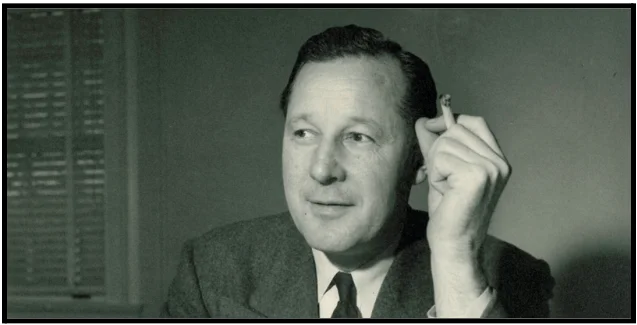Talking Big Ideas.
“Keep calm and carry on.”
~ British proverb from World War II
In 1968, Neil Armstrong was busy training.
NASA selected him as the pilot to land on the moon. The spaceship the astronauts would take was to stay in orbit. A tiny craft would leave the ship and make the final trek to the lunar surface.
Flying the tiny craft – called a lunar module – was notoriously hard. So NASA built a mock module for astronauts to practice piloting on Earth. They compared it to trying to balance a dinner plate at the end of a broom handle. Armstrong trained hard and learned to fly it well.
Then disaster struck.
Armstrong was hundreds of feet in the air when the vehicle malfunctioned. He tried to keep it steady but it was impossible to control. The lunar module fell from the sky, exploded, and smashed into the ground with a large fireball.
The crash was filmed and is haunting to watch. It seems impossible anyone could have survived. And yet, moments after impact, Armstrong is seen floating safely in his parachute to the ground. He ejected an instant before the craft exploded.
A few hours later Armstrong was filling out paperwork. The astronaut Alan Bean walked passed. They chatted for a while and then Bean continued on to a meeting where he heard about the disaster. He couldn’t believe it. How had Armstrong not said anything!? Bean went back and asked Armstrong if it was true.
“Yeah” was all Armstrong said.
Bean pressed him. Armstrong added, “I lost control and had to bail out on the darn thing.” And that was it. No drama. No bragging.
No anger, frustration, or stress.
The philosopher William Irvine writes in The Stoic Challenge:
Look around and we can find . . . examples of people who have demonstrated the ability to rise, quietly and bravely, to the challenges presented by significant setbacks.
Surfer Bethany Hamilton was just 13 years old when a shark bit off her arm. She calmly paddled back to shore with her other arm. Most of her blood was gone by the time she got to the hospital.
As she lay there, assuming her surf days were over, she decided to become a surf photographer. Yet in less than a month she was out surfing again. And two years later she won a national surfing championship.
Not all stories have happy endings.
Baseball superstar Lou Gehrig received a surprise death sentence on his 36th birthday. Two weeks later, he delivered a famous speech where he said, “I consider myself the luckiest man on the face of the Earth.” He later wrote, “I will accept it philosophically and hope for the best. That’s all we can do.”
Thankfully, most of us aren’t dealing with deadly explosions, shark attacks, and fatal illnesses. But life is full of setbacks and little annoyances.
We wake up tired and find we’re out of coffee. Zoom freezes. Our child has a tantrum in the back seat while we’re stuck in traffic and late for work. We talk to a colleague who stares at his phone the whole time. And that damn dog outside! It won’t stop barking.
Bigger setbacks happen too. We break a bone, lose out on a promotion, get dumped. And the monster setbacks, the life-altering and ending events – we’re all going to face them at some point.
Setbacks are everywhere. They’re inevitable. The quality of our lives depend on how we respond to them.
Some people allow every little annoyance to drive them nuts. They give setbacks control over their minds, which become filled with anger and stress. Others – like Armstrong, Hamilton, and Gehrig – seem to have a super power. They can remain calm and peaceful regardless of what comes their way.
This super power is foundational to success and fulfillment. And it’s one we can all cultivate.
The key is framing.
The Nobel Laureate Daniel Kahneman – author of the classic Thinking, Fast and Slow – has shown that simple framing exercises can change how we think and act.
For example, ice cream marketed as “90% sugar free” will be more popular than ice cream that’s “10% sugar.” A spray that promises to kill 95% of germs will outsell one promoting a 5% germ survival rate. The products are identical; the framing is different.
Philosophers have understood the power of framing for thousands of years. The ancient Stoic Epictetus taught that setbacks, regardless of size, will not upset us if we frame them correctly. Born a slave, he believed that giving setbacks power over our minds amounted to mental slavery. We must work to keep our minds free from their grasp.
Socrates embodied this at the highest level. Before being executed he said that the politicians in charge “have power to put me to death, but not to harm me.”
We can frame every setback we experience however we want.
The philosopher Seneca framed his setbacks as tests from the Roman deity Jupiter. He imagined Jupiter smiling down on him, playfully using the tests to help Seneca build a strong and healthy mind.
I like to use Ganesha because he’s beloved worldwide as one who helps you build wisdom. He’s known for creating and removing obstacles. And his elephant head is so vivid it’s easy to visualize.
You can use any character you’d like, of course. Imaginary or real. Every setback you face, big or small, is a test from them just for you. To pass you must stay calm and carry on.

I tried this on a recent trip.
I was at the DC airport waiting for a flight to Dallas, heading home to Durango. I was reading The Stoic Challenge when the airline announced our flight was delayed due to weather. Several people groaned. I was about to join them when I realized this was a perfect opportunity to apply my book.
Ganesha was behind the delay, I imagined, and he was doing it to test me. I played along, visualizing him smiling at me and encouraging me to stay calm. It worked! I didn’t feel angry or frustrated.
The flight kept getting delayed. I realized I would miss my connecting flight in Dallas. Just Ganesha giving me more tests, I told myself. It kept working.
When I got to Dallas I had to wait overnight for a new flight. People were yelling at airline officials. I curled up along a wall, listened to some of my favorite music, and visualized Genesha smiling at me. Incredibly, it was fun.
I reframed my cross country trip by imagining how hard it was for pioneers to make the same trek. Traveling for months in wagons. No roads. Catching dysentery, fighting natives, watching family die en route. And here I was about to “partake in the miracle of human flight . . . sitting on a chair in the sky” with plenty of water, a headrest, reclining seat, and flight attendants to help me.
What did I have to be upset about?

Seneca went so far as to express gratitude for his setbacks. He welcomed them as gifts that gave him the opportunity to grow.
Setbacks as gifts!
We can follow the lead of the wisest philosophers, scientists, and athletes. As the ancient monk Buddhaghosa taught:
Holding on to anger is like grasping a hot coal with the intent of throwing it at someone else. You are the one who gets burned.
***
![]() IDEA
IDEA
See setbacks as gifts from Ganesha.
Today you are going to face setbacks. Hopefully they are just little annoyances. Try this exercise:
- REFRAME: The instant a setback arises, imagine it’s a test from Ganesha.
- VISUALIZE: See Ganesha playfully smiling at you. He wants to help you grow.
- STAY CALM: Pass his test by staying calm and carrying on.
BONUS: If you’d like a deeper dive on this subject, check out William Irvine’s books A Guide to the Good Life and The Stoic Challenge. (Hat tip to Jerry Brito for recommending these to me.)
***
For more like this:
- Holidays, Permanent Revolution, Pretty Flowers
- A New Year, A Beginner’s Mind
- Four Thousand Weeks on the Pale Blue Dot
If you find this useful, please subscribe to our free weekly newsletter.




